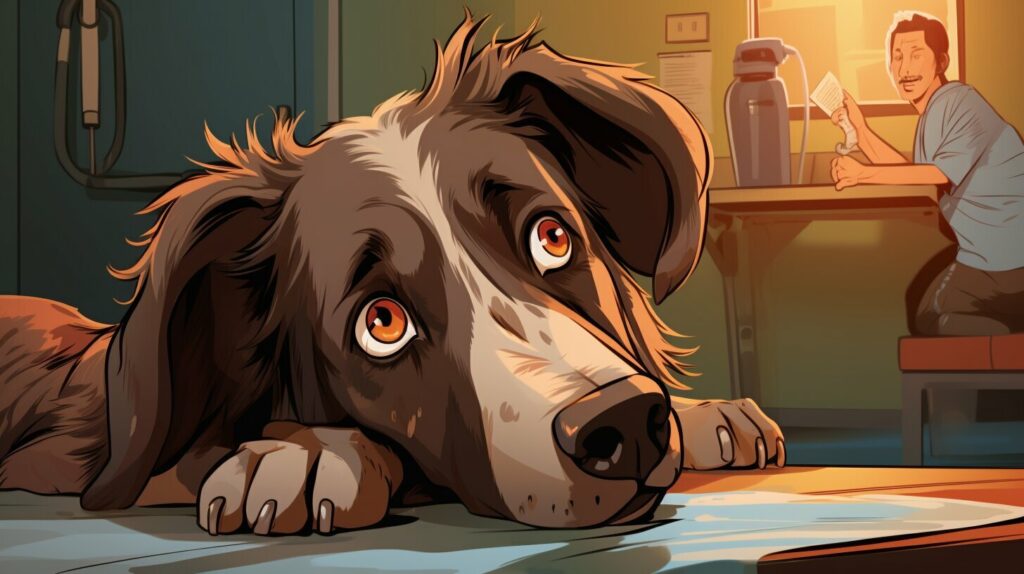If you’re a dog owner, it’s important to be aware of a serious disease that can affect your furry friend: distemper. This virus can lead to a variety of symptoms and can even be fatal in some cases. Knowing how to recognize the signs of distemper and what to do if your dog is affected can help you protect your pet.
In this section, we’ll take a closer look at distemper in dogs, including the causes, symptoms, and treatment options available to you. By the end of this section, you’ll have a better understanding of what distemper is and how to keep your dog safe and healthy.
Key Takeaways:
- Distemper is a serious virus that can affect dogs.
- Recognizing the symptoms of distemper is important in protecting your pet.
- Preventative measures, such as vaccines and maintaining a clean environment, can help reduce the risk of distemper in dogs.
- If your dog is diagnosed with distemper, there are treatment options available, including supportive care and antiviral medications.
What is Canine Distemper?
Canine distemper is a highly contagious viral disease that affects dogs and other animals in the family Canidae. The distemper virus attacks several organs in the body, including the respiratory, gastrointestinal, and nervous systems, which can lead to a range of symptoms.
The virus is transmitted through direct contact with infected animals or their bodily fluids, such as saliva, urine, or feces. Dogs that are not vaccinated or have weakened immune systems are at higher risk of contracting distemper.
Distemper in dogs is often fatal, and even those that survive may experience long-term effects such as neurological problems or weakened immune systems. It is important to recognize the symptoms of distemper and seek proper treatment to improve the chances of recovery.
Symptoms of Distemper in Dogs
It’s important to recognize the signs of distemper in dogs early on to ensure prompt treatment. Common symptoms of distemper in dogs include:
- Fever
- Coughing
- Sneezing
- Thick discharge from nose and eyes
- Loss of appetite
- Vomiting
- Diarrhea
- Lethargy
- Weakness
- Seizures
- Paralysis
Distemper can affect different systems in a dog’s body, including the respiratory, gastrointestinal, and nervous systems, which is why it can present with a variety of symptoms. If you notice any of these symptoms in your dog, it’s important to take them to the vet as soon as possible for a proper diagnosis and treatment.
Note: Some dogs may not show any symptoms of distemper, but they can still be carriers of the disease and transmit it to other dogs.
Prevention of Distemper in Dogs
Preventing distemper in dogs is crucial, as the disease is highly contagious and can be fatal, particularly for young puppies and dogs with weakened immune systems. Fortunately, the distemper vaccine is highly effective in preventing the disease’s spread.
The distemper vaccine for dogs is part of the standard puppy vaccination series. After completing the initial vaccination series, a booster is typically required every one to three years, depending on the vaccine’s type and your dog’s lifestyle and risk factors.
In addition to vaccination, there are several other preventive measures you can take to reduce your dog’s risk of distemper:
- Keep your dog away from other dogs that may be infected.
- Avoid contact with wildlife that can carry the virus, such as raccoons and skunks.
- Clean and disinfect any surfaces and objects your dog comes into contact with, particularly if they have been in contact with an infected dog.
- Keep your dog’s living space clean and sanitary.
- Ensure that your dog has a healthy diet and lifestyle to boost their immune system.
Remember, prevention is always better than treatment when it comes to distemper in dogs. Speak to your veterinarian about the appropriate vaccination schedule and other preventive measures for your furry friend.
Diagnosing Distemper in Dogs
Diagnosing distemper in dogs is crucial for their health and wellbeing. The disease can be challenging to diagnose, but early detection is essential for a successful treatment outcome. The following are ways in which distemper is diagnosed in dogs:
Physical Examination
A physical examination is the first step in diagnosing distemper in dogs. The vet will examine your dog’s eyes, nose, and throat for signs of infection. They will also check for any neurological symptoms such as seizures, weakness, or imbalance.
Laboratory Tests
Laboratory tests can help diagnose distemper in dogs. The vet will take a blood sample and test it for antibodies to the distemper virus. They may also test for secondary bacterial infections and other diseases that can have similar symptoms to distemper.
Imaging Studies
If neurological symptoms are present, imaging studies such as an MRI or CT scan may be required. These tests can help the vet determine the extent of brain damage caused by the virus.
It is important to note that while these tests can help diagnose distemper in dogs, a definitive diagnosis may require specialized testing and consultation with a veterinary specialist.
If you suspect that your dog may have distemper, seek veterinary attention immediately. Quick action can help prevent the disease from progressing and improve the chances of a full recovery.
Treatment for Dog Distemper
Once your dog has been diagnosed with distemper, treatment will depend on the severity of their symptoms. Unfortunately, there is no specific cure for the canine distemper virus, but various treatments can improve your dog’s chances of recovery.
Supportive care: Dogs infected with distemper need to receive supportive care to relieve their symptoms and maintain their overall health. This may include providing a warm, comfortable environment, offering plenty of fluids and a nutritionally balanced diet, and managing any secondary bacterial infections that may arise.
Antiviral medications: While there is no specific medication to kill the canine distemper virus, your veterinarian may prescribe antiviral medications to slow its progression and reduce its impact on your dog’s health. These medications must be used with caution and only under professional guidance.
Managing secondary infections: Dogs with distemper are more susceptible to secondary bacterial infections, such as pneumonia. Your veterinarian may need to administer antibiotics to combat these infections and support your dog’s immune system.
It is crucial to closely monitor your dog’s symptoms during treatment and follow all instructions from your veterinarian. Although some dogs may recover from distemper, others may experience long-term health complications and neurological damage.
Overall, early detection and intervention are key to managing distemper in dogs. Seek veterinary care as soon as you notice any signs of illness in your pet.
Prognosis and Recovery for Dogs with Distemper
If your dog has been diagnosed with distemper, you may be wondering about their prognosis and recovery. The outlook for dogs with distemper can vary, depending on the severity of their illness and how quickly they receive treatment.
While there is no cure for distemper, supportive care can help manage the symptoms and improve your dog’s chances of recovery. This may include intravenous fluids to prevent dehydration, medications to control vomiting and diarrhea, and antibiotics to treat secondary bacterial infections.
Antiviral medications are also available for dogs with distemper, but they must be given early in the course of the illness to be effective. Your vet may also recommend immunomodulatory drugs to support your dog’s immune system.
The recovery process for dogs with distemper can be slow and may require ongoing care. Some dogs may experience long-term effects such as neurologic problems or weakened immune systems.
What Can You Do to Help Your Dog Recover from Distemper?
If your dog has been diagnosed with distemper, there are several things you can do to help support their recovery:
- Ensure they receive the recommended treatment, including medications and supportive care.
- Maintain a clean and comfortable environment to prevent secondary infections.
- Provide plenty of rest and hydration for your dog.
- Feed your dog a nutritious diet to support their immune system.
- Follow up with your vet regularly to monitor your dog’s progress.
With proper treatment and care, many dogs with distemper are able to recover and lead happy, healthy lives. Remember, the key to successful treatment is early recognition and intervention, so be sure to seek veterinary care if you suspect your dog may have distemper.
Frequently Asked Questions about Distemper in Dogs
As a responsible dog owner, you want to ensure that your furry companion is healthy and protected from diseases such as distemper. Here are some frequently asked questions about distemper in dogs, its vaccine, and treatment:
What is the distemper vaccine for dogs?
The distemper vaccine for dogs is a vaccination that helps protect your dog from the canine distemper virus. It is typically included in a combination vaccine that also protects against other common dog diseases such as parvovirus, adenovirus, and parainfluenza.
When should my dog get a distemper vaccine?
Your dog should receive their first distemper vaccine between 6 and 8 weeks of age, with booster shots every 3-4 weeks until they are 16 weeks old. After that, they should receive a booster shot every 1-3 years, depending on the recommendations of your veterinarian.
Are distemper shots for dogs safe?
Yes, distemper shots for dogs are generally safe and effective. However, as with any vaccination, there is a risk of side effects such as fever, lethargy, and allergic reactions. Your veterinarian can provide you with more information on the potential risks and benefits of the distemper vaccine for your dog.
Can my dog still get distemper if they have been vaccinated?
While the distemper vaccine is highly effective, there is no vaccination that provides 100% protection against the virus. However, if your dog does contract distemper despite being vaccinated, their symptoms are likely to be milder and the disease less severe than if they had not been vaccinated.
What are the potential complications of distemper in dogs?
Complications of distemper in dogs can include pneumonia, seizures, and encephalitis. Additionally, the virus can weaken your dog’s immune system, leaving them susceptible to secondary bacterial infections. It is important to seek prompt veterinary treatment if you suspect your dog has distemper.
Can distemper be cured in dogs?
While there is no cure for distemper in dogs, supportive care can help manage symptoms and improve your dog’s chances of recovery. Treatment may include intravenous fluids, antiviral medications, and antibiotics to prevent secondary infections. The prognosis for dogs with distemper depends on the severity of their symptoms and how quickly they receive treatment.
- If you suspect your dog may have distemper, contact your veterinarian immediately.
- Make sure your dog is up-to-date on their distemper vaccine and booster shots.
- Practice good hygiene to help prevent the spread of the virus, such as washing your hands and disinfecting your dog’s toys and bedding.
By staying informed on distemper in dogs and taking proactive measures to prevent and treat the disease, you can help keep your furry friend happy and healthy.
Conclusion
Distemper in dogs is a serious infectious disease that can have devastating effects on your furry friend’s health. It is caused by the canine distemper virus and is highly contagious among dogs.
Early recognition of the symptoms of distemper is crucial for the successful treatment of the disease. Some common symptoms of distemper in dogs include fever, cough, runny nose, vomiting, and diarrhea. Proper preventive measures such as vaccination and maintaining a clean environment can help reduce the risk of your dog contracting the disease.
If your dog has been diagnosed with distemper, there are available treatments to manage the symptoms and mitigate the effects of the disease. However, the prognosis and recovery process for dogs with distemper can vary depending on the severity of the infection and the effectiveness of the treatment.
It is important to work closely with your veterinarian to ensure that your dog receives the best possible care for their condition. Remember, recognizing the symptoms, preventing the disease, and seeking proper treatment are crucial in keeping your furry friend happy and healthy.
FAQ
Q: What is distemper in dogs?
A: Distemper is a contagious viral disease that affects dogs, causing a wide range of symptoms and potentially serious complications.
Q: How is distemper transmitted?
A: Distemper is spread through direct contact with infected bodily fluids or respiratory droplets from infected dogs. It can also be transmitted through contaminated objects or surfaces.
Q: What are the common symptoms of distemper in dogs?
A: The symptoms of distemper in dogs can vary but often include fever, coughing, nasal discharge, lethargy, loss of appetite, vomiting, diarrhea, neurological signs like seizures or tremors, and eye inflammation.
Q: How can distemper in dogs be prevented?
A: Vaccination is the key to preventing distemper in dogs. Regular vaccinations, along with maintaining a clean environment and avoiding contact with infected animals, can help reduce the risk of infection.
Q: How is distemper diagnosed in dogs?
A: Distemper can be diagnosed in dogs through physical examinations, laboratory tests (such as blood tests and PCR testing), and imaging studies (like X-rays or ultrasounds) to evaluate organ damage.
Q: What are the available treatments for distemper in dogs?
A: Treatment for distemper in dogs is mainly supportive care, including fluids, medications to control symptoms, and addressing secondary infections. There is no specific antiviral treatment for distemper.
Q: What is the prognosis and recovery process for dogs with distemper?
A: The prognosis for dogs with distemper can vary depending on the severity of the disease and the dog’s overall health. Some dogs can recover with appropriate treatment, while others may experience long-term effects or even death.
Q: How often should dogs be vaccinated for distemper?
A: Puppies typically receive a series of distemper vaccinations starting at around 6 to 8 weeks of age, with boosters given every few weeks until they are around 4 months old. Adult dogs should receive regular distemper vaccine boosters as recommended by their veterinarian.
Q: Can dogs still get distemper if they have been vaccinated?
A: While vaccination significantly reduces the risk of distemper, no vaccine is 100% effective. However, vaccinated dogs who do contract distemper often have milder symptoms and a better chance of recovery compared to unvaccinated dogs.
Q: Are there any potential complications associated with distemper in dogs?
A: Yes, distemper can lead to various complications, including pneumonia, encephalitis (inflammation of the brain), and permanent damage to the nervous system, which can result in seizures, coordination issues, or behavior changes.



